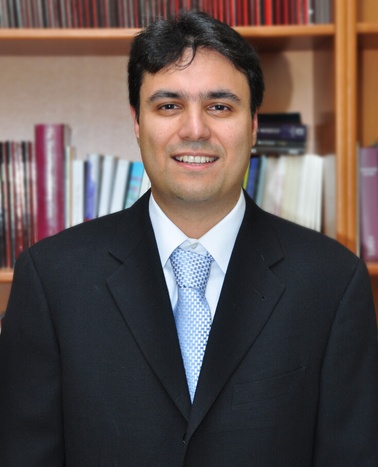
David Moshfegh
I was born into a Jewish family in Tehran, Iran. The Islamic Revolution occurred during my early childhood, and I grew up in the Islamic Republic in the midst of the horrendous war of the 1980s between Iran and Iraq that the rest of the world has mostly forgotten. At that time, Iran lacked access to sophisticated weaponry and was continuously forced to lower the age of conscription, relying on its larger population. The government had begun deploying soldiers as young as thirteen, so when I was close to that age my parents decided to escape the country. After a long, complicated journey, we made it to the US.
"When you are learning, he says, you experience flashes of insight as well as the sensation of achievement and growth. But these benefits only come with the acceptance of difficulty and a willingness to challenge yourself to live beyond your comfort zone."
Finding a common language through humanities
David, a Professor of History and Humanities at IE University, freely admits that moving from one culture to a radically different one as a teenager was a shock. For more than a decade, his life featured constant change. Moving homes, changing schools, and eventually going to university forced him to live outside of his comfort zone, and he describes himself as a man who loves comfort!
But David knows that, reflecting on those formative years, they decisively shaped his conception of learning. Perhaps, he ponders, it even led him to become a teacher and a researcher, since learning involves a willingness to move beyond your comfort zone. When you are learning, he says, you experience flashes of insight as well as the sensation of achievement and growth. But these benefits only come with the acceptance of difficulty and a willingness to challenge yourself to live beyond your comfort zone.
David completed a degree in Philosophy and History at Stanford University before going on to receive a PhD in History at the University of California, Berkeley. His specialism was modern European intellectual history, and he has a particular interest in the intersection of the development of academic disciplines in European universities, European orientalism and imperialism. Perhaps unsurprisingly given his family background, he has also undertaken research into the experience of religious minorities, particularly Jewish communities, within the historical trajectory of Islamic societies.
David came to IE University in 2012 as a postdoctoral fellow, teaching humanities to undergraduate students. He became an internal professor of humanities in 2014, and has taught a variety of courses in the subject across a number of both undergraduate and master’s programs here. His topics are certainly broad in their overall scope, covering the history of international relations, political theory and a critical history of innovation among many others. He has even, this past year, taught ancient and medieval philosophy, a first for the Bachelor in Philosophy, Politics, Law and Economics. He describes breaking this new ground as one of the most positive experiences he has had at IE University.
Humanities present, according to David, both a real challenge and a singular opportunity to a teacher. At most universities in the world, he contends, professors in the subject will come into the classroom with a sense of the cultural experiences and assumptions of their students. Their task will be to expose students to different ways of life, including different social and political expectations from the ones they take for granted.
The typical aim, he explains, is to allow students to rediscover themselves in a larger world. This approach is simply not possible at IE University, where the enormous diversity of the entire community makes any general assumptions about the cultural trajectory of students impossible. Instead, the real opportunity that teaching humanities at IE University offers is the chance to arrive at a common language for understanding who we are and where we’d like to go. This makes the classroom at IE University a model for cultural exchange and understanding, he asserts.
He offers the ancient and medieval philosophy class as evidence. Rather than the traditional search for understanding of the Greek origins of our ideals, his approach is to ask students what is radically distinct and provocative about those origins. David challenges students to examine themselves in a “Greek mirror.” How, he asks, would our approach to living life change if we could reexamine our concepts of subjective and objective truth?
Such are the questions David poses during the program, and we have no doubt that with such a diverse range of ideas and opinions from his global cohorts, he learns as much from their answers as they do from his questions.
